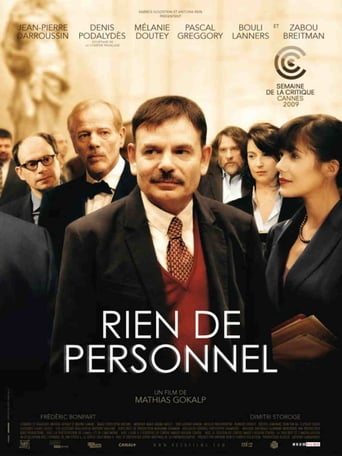



What makes it different from others?
The Worst Film Ever
It was OK. I don't see why everyone loves it so much. It wasn't very smart or deep or well-directed.
View MoreI think this is a new genre that they're all sort of working their way through it and haven't got all the kinks worked out yet but it's a genre that works for me.
View MoreWe are taken to what appears to be a party given by a pharmaceutical company. The guests are, for the most part, executives in different departments who have to engage interacting with other attendees in games that will be rated according to judges that allot limited time in which an employee will have to prove himself. The employees are there to be evaluated in how they conduct themselves in different levels. At one point, the rumor that has been circulating appears to be true. Mueller, the cynical head of the company has decided to sell.The news affects the employees in different way. Natacha Gauthier who has a lot to lose, is an aggressive young woman that faints as a result of the stress. Bruno, who appeared to be in the most vulnerable position, ends up resigned to what is coming. The union representative, Gilles, who has fought with Muller, gets an unexpected surprise at the end of the party. Marek, the bathroom attendant pulls an incredible stunt when he is confused with the boss.The film, directed by Mathias Gokalp, was shown recently on a French cable channel. Not knowing what it was about, we decided to take a chance, something that paid off in unexpected ways. The idea behind it has a lot to do with the heartless people that are attracted to big corporations who play with the fate of the people that are essential in the well being of the business. In today's environment, everyone is expendable, or so it appears what Mr. Gokalp wanted to explore.There are excellent appearances by Jean-Pierre Darroussin as Bruno and Denis Podalydes as Gilles. We had trouble recognizing Mr. Darroussin, who is the best thing in the film. Pascal Greggory is seen as Muller. Melanie Doutey has some good moments as Natacha. Frederic Bonpart is disarming in the role of Marek.
View MoreI don't understand why this movie is so underrated. Good acted, specially, Jean-Pierre Darroussin. Darrousin shows so many resources that really appalled me. The film has a rhythm that French movies usually lack. I think the three chapters and their sutil and soft changes of perspective are the greatest merit of this movie. I guess this style isn't innovative (remember Rashomon?) but is well articulated and the repeated scenes aren't boring, far from that, it's turn more interesting with every turn. Then the big picture only becomes clear in the third and final part, "All Together," which takes up about half the film and again reshuffles and elaborates on what has come before finally allowing the characters to function independently and showing all their cards.
View MoreA group of elegantly dressed people enter a museum among windows filled with écorchés, skulls in cross-section and moldings of eye globes. The tone is set. "Rien de personnel" will be the modern equivalent of a vanity painting, showing the transience of success, the frailty of those who are at the top. A powerful symbolical introduction indeed. But who exactly are these people? We soon learn that most of them are the executives of a pharmaceutical company who have been invited by Muller (cynically haughty Pascal Greggory), their managing director , to a party celebrating the marketing of a new product. But petits fours and champagne are not the only pleasures on the menu. At the same time the guests' skills are being tested by the management through scenes played with coaches (i.e. actors). Not a very festive atmosphere, all the more as rumors of buyout and of layoffs start circulating As you can imagine, the situation can only deteriorate, and it does! But this is the only thing you can be sure of. For the originality of the film is that it is told three times, each time under a different angle. This challenging device aptly shows that reality can be delusive. The writer-director first deceives the viewer the way Muller acts towards his employees then gradually reveals the truth. As a result, we find that not all the characters are the persons we believed they were in the first place and it is fun to discover their true faces after having been misguided by Matias Gokalp.But this whodunit-like aspect of the film is only value added to the message of the film. "Rien de personnel" is for sure a brilliant stylistic composition but it is also - and I would say above all - an attack against the ruthless inhumanity of today's world of work, the absolute power of money, making man a wolf to man.Wonderfully played by an excellent cast, particularly by the two leads (Jean-Pierre Darroussin in one of the most complex roles he ever played and Denis Podalydès very convincing as an hesitating shop steward ), "Rien de personnel" is also masterfully done by its helmer . Filming in two closed natural settings (a museum and a hospital in Chartres), with a set filled most of the time with actors and extras, skilfully dealing with three slightly different versions of the story, making 'Rien de personnel' must not have been a pleasure cruise. But Mathias Gokalp remains in command throughout, concluding his film as satisfyingly as he opened it.Don't miss this first film by Gokalp. It combines intelligence and entertainment. Not such a bad cocktail,is it?
View More